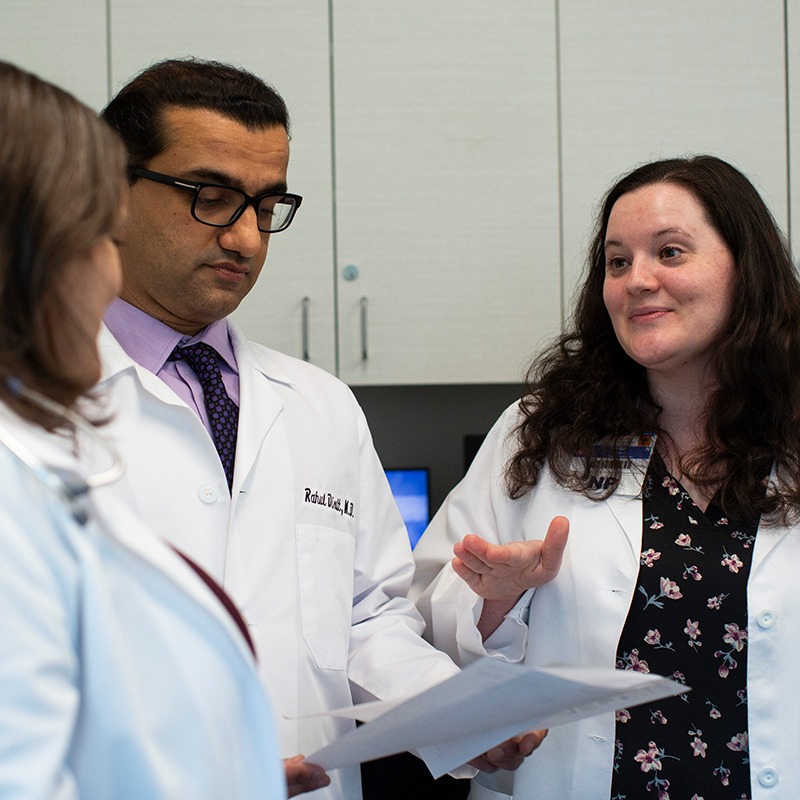Liver Disorders

Overview
Liver Disorders Overview
There are a myriad of liver disorders, which can be caused by a variety of factors such as viruses, alcohol use and obesity or inherited conditions. These conditions can lead to damage such as scarring (cirrhosis), which can lead to life-threatening liver failure.
Some liver disorders include:
Infections such as viral hepatitis are the most common:
- Hepatitis A typically spreads from contaminated food or water or contact with someone who is infected. Hepatitis A is usually self-limiting and resolves without long term issues.
- Hepatitis B is a serious liver infection with long term consequences. It can be prevented by vaccination that is available. While some may recover from Hepatitis B, Hepatitis B can become a chronic infection. The disease is spread by exposure to infected body fluids.
- Hepatitis C may be contracted by exposure to contaminated blood such as sharing needles or unsterile tattoo equipment. Healthcare workers might get it from an infected needle that accidently sticks them. Development of new therapies in the last decade has allowed successful eradication and cure for most Hepatitis C carriers.
Immune System Problems
Your immune system fights off bacteria and viruses, but it can go wrong and attack one or more parts of your body including the liver:
- Autoimmune hepatitis: This inflames your liver and can lead to liver failure. It affects girls and women more often than men.
- Primary biliary cholangitis: This disorder attacks the bile ducts and when the ducts are injured, the bile backs up into your liver and causes scarring. It affects women more often than men.
- Primary sclerosing cholangitis scars your bile duct and can eventually block them. It may lead to liver cancer. It affects men more than women.
Liver Cancers
If you have cancer in your liver, it most likely has spread from another part of your body such as the lungs, colon or breasts. However, a few cancers can start in your liver:
- Liver cancer affects women more often than men, and African-American more often than whites. It is more likely if you have hepatitis or drink too much alcohol.
- Bile duct cancer affects people over age 50, but it’s uncommon.
- Liver adenoma is a tumor that doesn’t have cancer. It’s uncommon and women who take birth control pills for a long time are more prone to develop it. It could eventually turn into cancer.
Inherited disorders that run in your family:
- Hemochromatosis is when your body stores up too much iron from your blood. It can lead to life-threatening conditions such as liver diseases, heart disease, or diabetes.
- Hyperoxaluria is when your urine has too much a chemical called oxalate. This can cause kidney stones and kidney failure.
- Wilson’s disease makes copper build up in your liver and other organs. It typically shows up between the ages of 6 to 35 and not only affects your liver, but it can cause nerve and psychiatric problems.
- Alpha-1 antitrypsin deficiency is a chemical your liver makes to help your lungs resist infections. The liver sometimes makes a faulty chemical that can build up and cause liver diseases.
Other causes of liver disorders include:
- Alcohol abuse can lead to cirrhosis.
- Drug overdoses can harm your liver when you take too much acetaminophen or other medications.
- Nonalcoholic fatty liver diseases are when too much fat builds up inside your liver and inflames your liver. It can scar your liver and cause other disorders such as cirrhosis.
- Other risk factors for liver disease include Type 2 diabetes, tattoos or piercings, blood transfusions before 1992 and exposure to certain chemicals and toxins.
Symptoms
Liver Disorders Symptoms
Liver disease signs and symptoms may include:
Diagnosis
Liver Disorders Diagnosis
Blood Tests
Liver function blood tests to check for certain enzymes and other proteins that occur only when your li
ver is damaged or has a disease.
Imaging tests
Imaging tests such as ultrasound, CT scan and MRI.
Biopsy
Removing a tissue sample (biopsy) from your liver.
Complications
Liver Disorders Complications
Complications of liver disorders vary and untreated liver disorders may become life-threatening. These include:
- Acute liver failure can occur within a very short time because of an overdose of acetaminophen, infections or because of prescription drugs.
- Cirrhosis is when the buildup of scars in your liver make it harder for your live to function properly.

Treatments
Liver Disorders Treatments
Your doctor will develop a treatment plan based on your diagnosis. Some liver problems can be treated with lifestyle changes, such as stopping alcohol use, diet changes and weight loss as well as stopping smoking. Other liver disorders may be treated with medications and surgery. If you have liver failure you may need a liver transplant; however, procuring a healthy liver matching your blood type in a timely manner can be very difficult.
If you have concerns or symptoms of a liver disorder you are concerned about, make an appointment with one of our specialists.
Specialists





